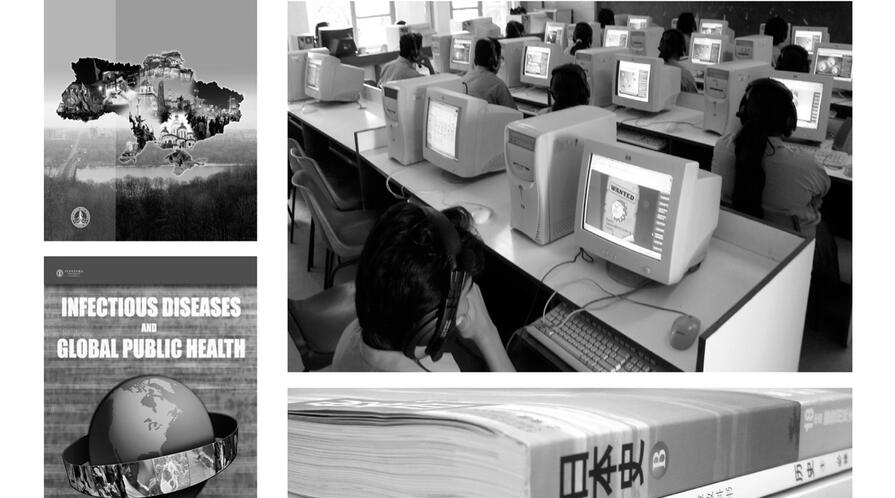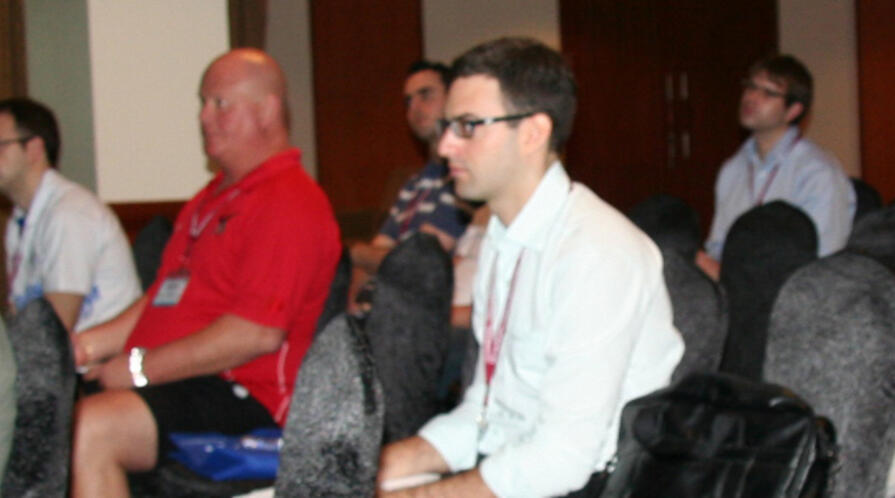“From Cold War to Hot Peace: An Ambassador in Putin’s Russia,” a book talk for educators by Ambassador Michael McFaul
On January 18, 2019, Stanford Global Studies and the Stanford Program on International and Cross-Cultural Education (SPICE) hosted a book talk by Professor Michael McFaul. McFaul served for five years in the Obama administration, first as Special Assistant to the President and Senior Director for Russian and Eurasian Affairs at the National Security Council (2009–2012), and then as U.S. Ambassador to the Russian Federation (2012–2014). He is also one of several contributing scholars to Inside the Kremlin, SPICE’s lesson plan on Soviet and Russian history. McFaul’s talk was given to approximately 30 community college and secondary school educators from the San Francisco Bay Area. Three of the educators—Nancy Willet, Phillip Tran, Don Uy-Barreta—are 2018–19 Stanford Education Partnership for Internationalizing Curriculum (EPIC) Fellows, and this article highlights their reflections.
Ambassador McFaul has described From Cold War to Hot Peace as “three books in one.” First, it is a book that explains the arc of U.S.–Russia relations since the end of the Cold War. Second, it a book that describes the “reset” in U.S.–Russia relations and its aftermath during the Obama presidency. Third, it is a book about McFaul’s life that describes how his involvement with the debate team at Bozeman High School, Montana, sparked his interest in Russia and led to his subsequent study of Russia at Stanford University, Oxford University, and in Russia itself. During his talk, he touched upon all three.
McFaul’s reflections not only provided the educators with important content on U.S.–Russia relations and insights from his youth to his ambassadorship, but also prompted the educators to consider effective teaching and pedagogical strategies. McFaul’s use of storytelling, presentation of multiple perspectives, emphasis on interdisciplinarity, and sharing of first-hand accounts gave the educators a glimpse into McFaul not only as an academic and diplomat but as a teacher.
EPIC Fellow Nancy Willet, Co-chair of the Business & Information Systems Department, College of Marin, noted, “I was most impressed with Ambassador McFaul’s engaging storytelling. His first-hand insights of his time spent studying and working in Russia challenged some of my misguided assumptions and helped expand my understanding of the complexities of U.S.–Russia relations. I grew up during the Cold War and the Ambassador disrupted some of my deep-rooted misconceptions about the former Soviet Union and further opened my mind for a more nuanced understanding.” In a follow-up communication, Willet said that she is devouring From Cold War to Hot Peace and plans to share McFaul’s scholarly insights with her law students—particularly when discussing democracy and rule of law—here and abroad.
EPIC Fellow Philip Tran, Instructor of Business, San Jose City College, remarked that “Ambassador McFaul’s talk reinforced the complicated notion of human relations and the importance of an interdisciplinary study of it—including political science, business, economics, etc. Interdisciplinarity is a key to grasping a better understanding of human relations.” He continued by noting that the biggest take-away from McFaul’s talk was that it cautioned him as a teacher to “refrain from the natural ‘knee-jerk’ reactions and to seek a deeper understanding of the situation from all sides…. Even though Ambassador McFaul is a subject matter expert on U.S.–Russian relations, he displayed humility and acceptance of ambiguity in his responses to some of the toughest questions regarding the U.S. relationship with Russia and Vladimir Putin.”
EPIC Fellow Don Uy-Barreta, Instructor of Economics, De Anza College, reflected upon the significance of sharing first-hand experiences with students. He noted that “Reading about Ambassador McFaul’s experience is very informative, but being able to ask questions and hearing it from the source is a whole different level of experience. As he was telling us about his days in Russia, it felt like I was right next to him, and it gave me goosebumps.” Uy-Barreta found inspiration in McFaul’s talk as he prepares for his presentation on global economics at the EPIC Symposium on May 18, 2019 during which the 2018–19 EPIC Fellows will present their research at Stanford.
McFaul has given numerous talks on From Cold War to Hot Peace but this was the first geared to an audience of educators. As I observed his talk, I was primarily attentive to the pedagogical strategies that he utilized to engage the educators. For me, his effective teaching made the history and insights in From Cold War to Hot Peace come alive and feel more like “four books in one.”
This book talk was made possible by a U.S. Department of Education Title VI grant that provides professional development opportunities for K–12 teachers and community college instructors. Among these opportunities is EPIC, a program that provides one-year fellowships to community college instructors. Title VI grant collaborators include Stanford Global Studies (SGS), SPICE, Lacuna Stories, and the Stanford Graduate School of Education’s Center to Support Excellence in Teaching. SGS’s Denise Geraci and SPICE’s Jonas Edman organized and facilitated the talk by Ambassador McFaul.
SPICE also offers professional development opportunities for middle school teachers and high school teachers. To stay informed of SPICE news, join our email list or follow us on Facebook and Twitter.

SPICE releases 2012 catalog
The 2012 SPICE catalog is now available. SPICE developed five new curriculum units in 2011.
Nuclear Tipping Point: A Teacher's Guide
The documentary Nuclear Tipping Point tells the story of how four Cold War-era leaders—former Secretary of State George Shultz, former Secretary of Defense Bill Perry, former Secretary of State Henry Kissinger, and former Senator Sam Nunn—came together to address the threat of nuclear power falling into the wrong hands. Produced by the Nuclear Threat Initiative (NTI), the film is narrated by actor Michael Douglas and earned wide media attention when it came out in 2010.
Now, through a partnership between SPICE and NTI, the film is accompanied by a new teacher’s guide for classroom use of the documentary. The guide underscores the importance of teaching for critical literacy and addresses specific connections to the National Standards for History in the Schools. Student activities include multiple choice quizzes, persuasive writing and analysis, and ideas for creative projects.
China in Transition: Economic Development, Migration, and Education
China in Transition introduces students to modern China as a case study of economic development. What are the characteristics of the development process, and why does it occur? How is development experienced by the people who live through it, and how are their lives impacted? How do traditional cultural values—such as China’s emphasis on education—contribute to and/or evolve as a result of modernization? Students examine these questions and others as they investigate the roles that migration, urbanization, wealth, poverty, and education play in a country in transition.
The 20-year war in Vietnam was a prolonged and devastating conflict. In its aftermath, South Vietnamese civilians fled from the Communist takeover on perilous boat journeys that led to the formation of diasporic communities. Others faced lengthy detention in post-war re-education camps. This unit aims to help students learn and appreciate these and other important legacies that have shaped Vietnam and the world at large.
Angel Island: The Chinese-American Experience
Angel Island: The Chinese-American Experience is a graphic novel that tells the story of Chinese immigrants detained at Angel Island Immigration Station in San Francisco Bay between 1910 and 1940. It offers a stark contrast to the more celebrated stories of European immigrants arriving at Ellis Island on the East Coast and poses important questions about U.S. immigration policy, both past and present.
As the second-largest country in Europe, Ukraine has always stood at a crossroads of cultural influences. It is a key part of Europe–and the management of its relationships with other countries (in particular, Russia) is key to the future of the whole of eastern Europe. This unit seeks to provide high school teachers and students with a broad introduction to Ukrainian history with activities that touch upon Ukrainian culture.

SPICE Presented at EARCOS 2011
The Stanford Program on International and Cross-Cultural Education (SPICE) presented two workshops at the 2011 EARCOS Teachers' Conference in Kota Kinabalu, Malaysia.
On March 24, 2011, SPICE conducted a workshop entitled "The Atomic
Bombings and Their Legacies." This session introduced upper elementary and
secondary school teachers to activities and resources from the SPICE curriculum
units "Examining Long-Term Radiation Effects" and "Sadako's
Paper Cranes and Lessons of Peace." Given the recent events in Japan,
SPICE focused on presenting content from the curriculum unit, "Examining
Long-Term Radiation Effects," and worked with participants to develop
classroom activities to engage their students in a discussion about nuclear
issues.
On March 25, 2011, SPICE presented a second workshop entitled "Infectious Diseases and Global Public Health." This session introduced secondary school teachers to lessons and activities from two SPICE curriculum units: "Infectious Diseases and Global Public Health" and "TeachAIDS: A Comprehensive HIV/AIDS Prevention Curriculum." Participants engaged in a series of interactive activities and learned about new online teacher resources from SPICE and TeachAIDS, http://teachaids.org/.
The East Asia Regional Council of Schools (EARCOS) is an organization of 120 member schools in East Asia. EARCOS' mission is to inspire adult and student learning through its leadership and service.











